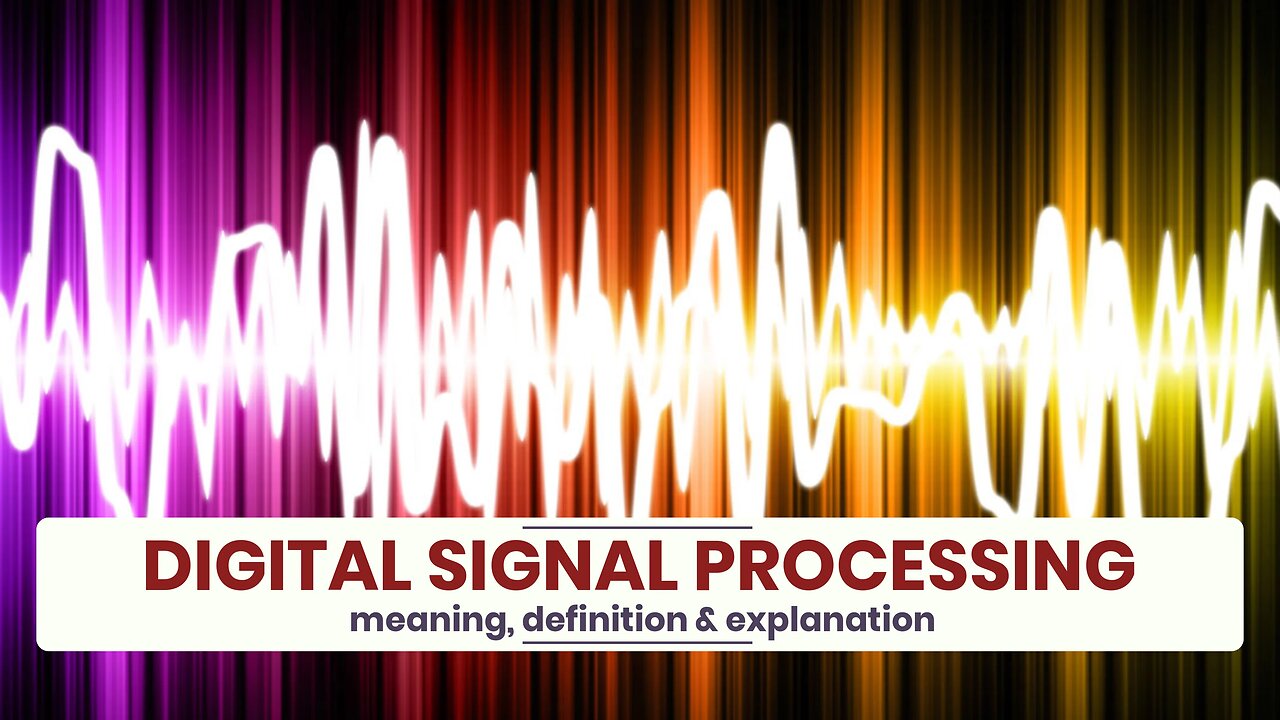Premium Only Content

What is DIGITAL SIGNAL PROCESSING?
✪✪✪✪✪
http://www.theaudiopedia.com
✪✪✪✪✪
What does DIGITAL SIGNAL PROCESSING mean? DIGITAL SIGNAL PROCESSING meaning - DIGITAL SIGNAL PROCESSING definition - DIGITAL SIGNAL PROCESSING explanation. What is the meaning of DIGITAL SIGNAL PROCESSING? What is the definition of DIGITAL SIGNAL PROCESSING? What does DIGITAL SIGNAL PROCESSING stand for? What is DIGITAL SIGNAL PROCESSING meaning? What is DIGITAL SIGNAL PROCESSING definition?
Digital signal processing (DSP) is the numerical manipulation of signals, usually with the intention to measure, filter, produce or compress continuous analog signals. It is characterized by the use of digital signals to represent these signals as discrete time, discrete frequency, or other discrete domain signals in the form of a sequence of numbers or symbols to permit the digital processing of these signals.
Theoretical analyses and derivations are typically performed on discrete-time signal models, created by the abstract process of sampling. Numerical methods require a digital signal, such as those produced by an analog-to-digital converter (ADC). The processed result might be a frequency spectrum or a set of statistics. But often it is another digital signal that is converted back to analog form by a digital-to-analog converter (DAC). Even if that whole sequence is more complex than analog processing and has a discrete value range, the application of computational power to signal processing allows for many advantages over analog processing in many applications, such as error detection and correction in transmission as well as data compression.
Digital signal processing and analog signal processing are subfields of signal processing. DSP applications include audio and speech signal processing, sonar and radar signal processing, sensor array processing, spectral estimation, statistical signal processing, digital image processing, signal processing for communications, control of systems, biomedical signal processing, seismic data processing, among others. DSP algorithms have long been run on standard computers, as well as on specialized processors called digital signal processors, and on purpose-built hardware such as application-specific integrated circuit (ASICs). Currently, there are additional technologies used for digital signal processing including more powerful general purpose microprocessors, field-programmable gate arrays (FPGAs), digital signal controllers (mostly for industrial applications such as motor control), and stream processors, among others.
Digital signal processing can involve linear or nonlinear operations. Nonlinear signal processing is closely related to nonlinear system identification and can be implemented in the time, frequency, and spatio-temporal domains.
-
 2:28
2:28
The Audiopedia
1 year agoWhat is MORTGAGE BROKER?
27 -
 25:41
25:41
Robbi On The Record
12 hours ago $2.22 earnedThe Billion-Dollar Lie Behind OnlyFans “Empowerment” (Her Testimony Will Shock You) | part II
11.1K8 -
 12:22
12:22
Cash Jordan
4 hours ago"CHICAGO MOB" Fights Back... "ZERO MERCY" Marines DEFY Judge, SMASH ILLEGALS
22.3K38 -
 46:58
46:58
Brad Owen Poker
16 hours agoI Make QUAD ACES!!! BIGGEST Bounty Of My Life! Turning $0 Into $10,000+! Must See! Poker Vlog Ep 323
12.9K6 -
 2:52:28
2:52:28
TimcastIRL
7 hours agoSTATE OF EMERGENCY Declared Over Food Stamp CRISIS, Judge Says Trump MUST FUND SNAP | Timcast IRL
233K128 -
 3:22:45
3:22:45
Tundra Tactical
14 hours ago $20.28 earned🚨Gun News and Game Night🚨 ATF Form 1 Changes, BRN-180 Gen 3 Issues??, and Battlefield 6 Tonight!
38.6K3 -
 1:45:13
1:45:13
Glenn Greenwald
10 hours agoJD Vance Confronted at Turning Point about Israel and Massie; Stephen Miller’s Wife Screams “Racist” and Threatens Cenk Uygur with Deportation; Rio's Police Massacre: 120 Dead | SYSTEM UPDATE #540
115K163 -
 LIVE
LIVE
SpartakusLIVE
7 hours agoSpart Flintstone brings PREHISTORIC DOMINION to REDSEC
349 watching -
 1:05:02
1:05:02
BonginoReport
10 hours agoKamala CALLED OUT for “World Class” Deflection - Nightly Scroll w/ Hayley Caronia (Ep.167)
133K82 -
 54:36
54:36
MattMorseTV
8 hours ago $29.85 earned🔴The Democrats just SEALED their FATE.🔴
63.2K106